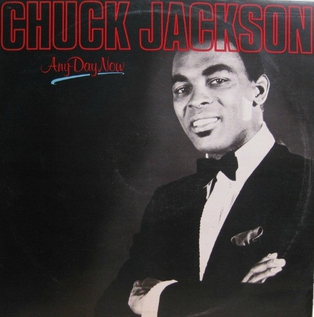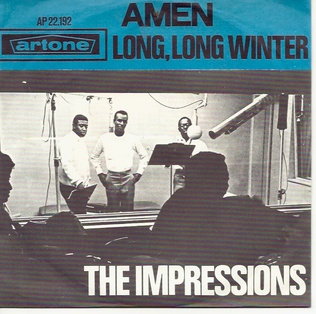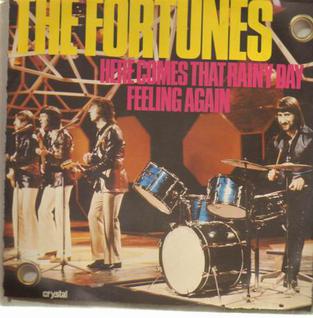Bubbling Under Hot 100 Singles is a chart published weekly by Billboard magazine in the United States. The chart lists the top songs that have not yet charted on the main Billboard Hot 100. Chart rankings are based on radio airplay, sales, and streams. In its initial years, the chart listed 15 positions, but expanded to as many as 36 during the 1960s, particularly during years when over 700 singles made the Billboard Hot 100 chart. From 1974 to 1985, the chart consisted of 10 positions; since 1992, the Bubbling Under Hot 100 Singles chart has listed 25 positions.
"Here Comes My Baby" is a song written by British singer-songwriter Cat Stevens. It is well known for being an international hit for the Tremeloes in 1967.

"Who's Sorry Now?" is a popular song with music written by Ted Snyder and lyrics by Bert Kalmar and Harry Ruby. It was published in 1923, when Isham Jones had a major hit with it. Other popular versions in 1923 were by Marion Harris, Original Memphis Five, Lewis James, and Irving Kaufman.

"Breaking Up Is Hard to Do" is a song recorded by Neil Sedaka, co-written by Sedaka and Howard Greenfield. Sedaka recorded this song twice, in 1962 and 1975, in two significantly different arrangements, and it is considered to be his signature song. Between 1970 and 1975, it was a top-40 hit three separate times for three separate artists: Lenny Welch, The Partridge Family and Sedaka's second version.

"Romantic" is a song by American singer Karyn White from her second studio album Ritual of Love (1991). It hit number one on the Billboard Hot 100 on November 2, 1991, making it her biggest hit to date. "Romantic" was also White's fourth number one on the Billboard Hot R&B Singles chart.

"I'll Never Fall in Love Again" is a popular song by composer Burt Bacharach and lyricist Hal David that was written for the 1968 musical Promises, Promises. Several recordings of the song were released in 1969; the most popular versions were by Dionne Warwick, who took it to number 6 on Billboard magazine's Hot 100 and spent three weeks topping the magazine's list of the most popular Easy Listening songs, and Bobbie Gentry, who topped the UK chart with her recording and also peaked at number 1 in Australia and Ireland, number 3 in South Africa and number 5 in Norway.

"Here You Come Again" is a song written by Barry Mann and Cynthia Weil, and recorded by American entertainer Dolly Parton. It was released as a single in September 1977 as the title track from Parton's album of the same name, topped the U.S. country singles chart for five weeks, and won the 1978 Grammy award for Best Female Country Vocal Performance; it also reached number three on the U.S. Billboard Hot 100, representing Parton's first significant pop crossover hit.
"Jeremiah Peabody's Polyunsaturated Quick-Dissolving Fast-Acting Pleasant-Tasting Green and Purple Pills" is a novelty song that was written and performed by Ray Stevens. It was released as a single in 1961 and became Stevens' very first Hot 100 single, peaking at #35 in September. Its lyrics tell of a fictional "wonder drug" that, when taken in a daily dose, can cure myriad ailments, much in the same way unscrupulous patent medicine salesmen marketed their wares in the 19th and early 20th centuries.

"Time" is a song released in 1981 as a single by the Alan Parsons Project. It was from their 1980 album The Turn of a Friendly Card. In the U.S., the song peaked at No. 15 on the Billboard Hot 100. On the U.S. Adult Contemporary chart, "Time" peaked at #10. In addition, "Time" spent two weeks at #14 on Cash Box, making it the group's second most successful single. Cash Box ranked it as the 94th biggest hit of 1981. Outside the US, the song peaked at #30 in Canada.

"Forever Came Today" is a 1967 song written and produced by the Motown collective of Holland–Dozier–Holland, and was first made into a hit as a single for Diana Ross & the Supremes in early 1968. A disco version of the song was released as a single seven years later by Motown group the Jackson 5.

"Take Your Time (Do It Right)" is the debut single by the S.O.S. Band. It was released on March 18, 1980 as the lead single from the debut album S.O.S. through Tabu Records, three months before the album's release.

"Any Day Now" is a popular song written by Burt Bacharach and Bob Hilliard in 1962. It has been recorded by numerous artists over the years, including notable versions by Chuck Jackson in 1962, Alan Price in 1965, Elvis Presley in 1969, Scott Walker in 1973 and Ronnie Milsap in 1982. In the lyrics, the singer predicts the imminent demise of a romantic relationship and describes the sadness this will leave.

"If You Love Me (Let Me Know)" is a song written by John Rostill that was a 1974 hit single for Olivia Newton-John. It was her second release to hit the top 10 in the United States, reaching number 5 on the pop chart and number 2 on the Easy Listening chart. It also reached number 2 on the Billboard country chart. As with her single "Let Me Be There", Mike Sammes sings a bass harmony. It was nominated for the 1974 Country Music Association Award for Single of the Year.

"Amen" is a traditional gospel song that was popularized by The Impressions with their 1964 version.

Paul Revere & the Raiders are an American rock band from Boise, Idaho. Formed in 1958, the band released their first hit single three years later, "Like, Long Hair", which reached number 38 on the U.S. Billboard Hot 100 chart. Following a few minor charting singles, including a version of "Louie Louie", the band worked with producer Terry Melcher in updating their sound, combining fast-paced, guitar-and-vocal-dominated rock and roll with an intimidating R&B flavor. The result was a string of commercially successful singles, beginning with 1965's "Steppin' Out" and continuing with "Just Like Me", which reached number 11 on the Hot 100, as well as "Kicks", "Hungry", and "Good Thing", all of which peaked inside the top 10. In addition, the band's three 1966 studio albums—Just Like Us!, Midnight Ride, and The Spirit of '67—were each certified gold in the United States.

"It's Sad to Belong" is a song written by Randy Goodrum and performed by England Dan & John Ford Coley on their 1977 album, Dowdy Ferry Road. Called a "timeless classic", it peaked at #21 on the Billboard Hot 100 chart and #1 on the easy listening chart. It was one of the earlier pop hits in Goodrum's career.

You've Got a Friend is the twenty-eighth studio album by American pop singer Andy Williams, released in August 1971 by Columbia Records. The album bears a striking resemblance to the Johnny Mathis album You've Got a Friend released that same month. Besides sharing their name, the two albums are both made up of covers of easy listening hits of the time, with 11 songs each, and the two albums have seven songs in common that are positioned in a similar order.

"Keep On Dancing" is a rock song written by Allen A. Jones, Andrew Love and Richard Shann, originally recorded by the U.S. R&B group, The Avantis on Argo Records in 1963.

"Here Comes That Rainy Day Feeling Again" is the title of a pop song composed by Tony Macaulay, Roger Cook, and Roger Greenaway; it became the third U.S. Top 40 hit for The Fortunes in 1971, and their fifth in Canada.
















